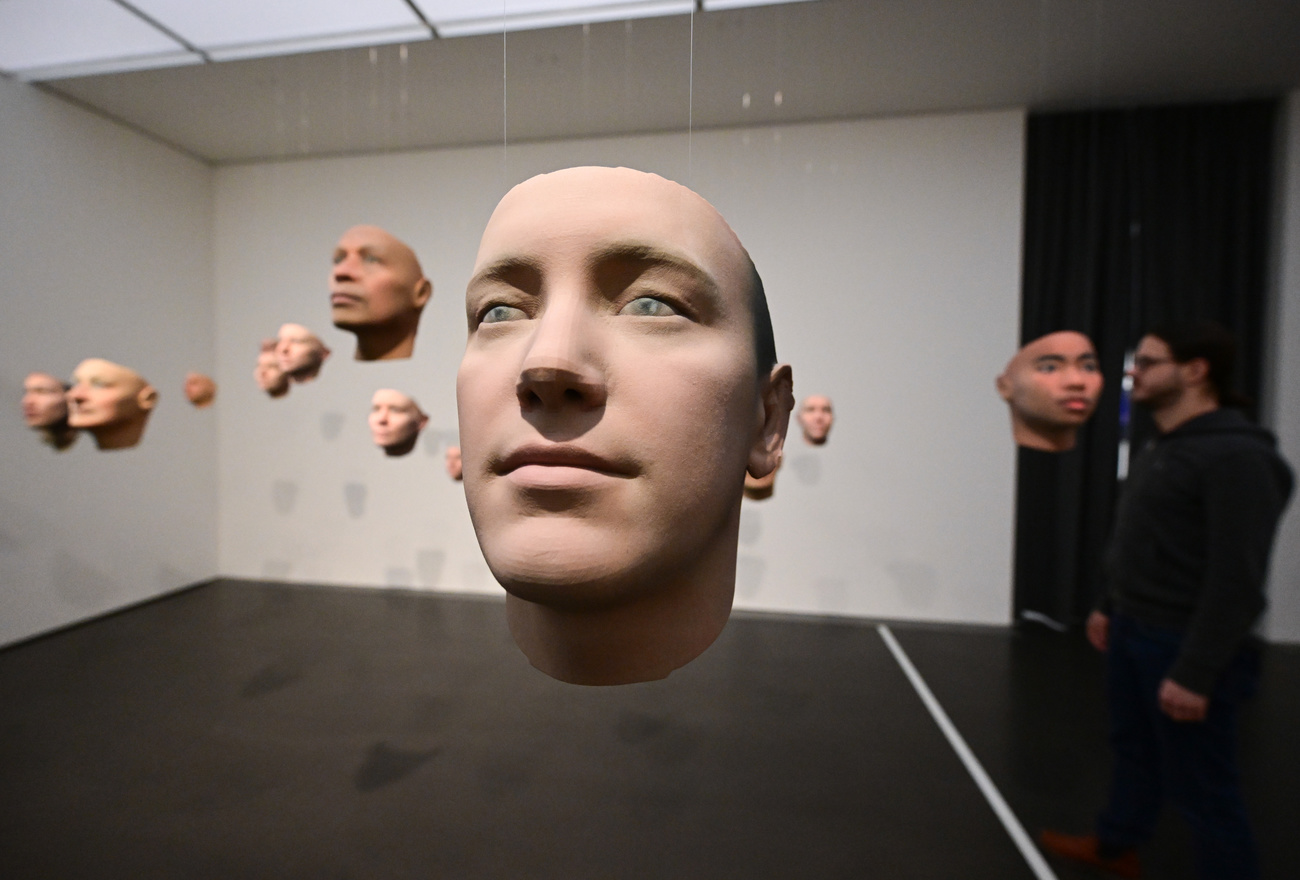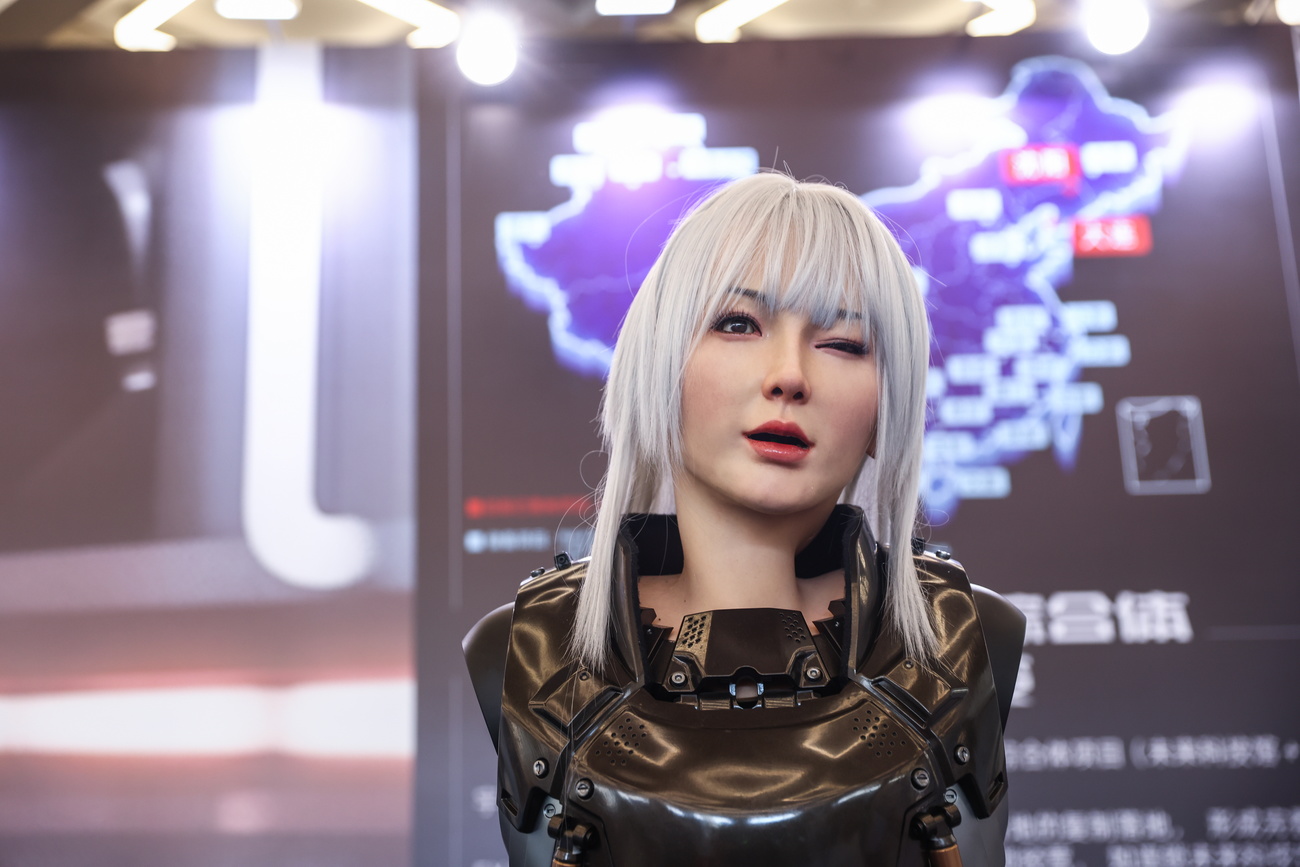
Switzerland risks exclusion from Europe’s ‘CERN for AI’

The European Union has announced investments in artificial intelligence (AI) worth many billions of euros with the ambition of creating a “CERN for AI”. But the inclusion of Switzerland, home to the world-renowned particle physics laboratory, may be limited by its non-EU status.
“We want to replicate the success of CERN in Geneva,” European Commission President Ursula von der Leyen saidExternal link at the AI Action Summit in Paris in February. To achieve this goal, the EU has earmarked €200 billion (CHF190 billion) for the construction of AI “gigafactories”, huge advanced data centres to boost Europe’s technology infrastructure and accelerate the development of AI. The vision is clear: to create a “CERN for AI”.
CERN, the European Organization for Nuclear Research, is one of the world’s most renowned scientific institutions, responsible for groundbreaking discoveries such as the Higgs boson particle and the invention of the World Wide Web. Established in 1954 – decades before the EU itself – CERN was deliberately placed in Switzerland to ensure its neutrality and international accessibility. It remains a hub for cutting-edge physics research, hosting projects such as the Large Hadron Collider (LHC), the world’s most powerful particle accelerator.
A new “CERN for AI” could serve a similar role for artificial intelligence, shaping global research and setting new standards in machine learning, robotics, and ethical AI governance.

More
Artificial intelligence in Switzerland: what’s new for 2025
Switzerland at the forefront of AI research
However, unlike CERN, Switzerland may find itself excluded from this new European project. “Normally this initiative is aimed at EU countries,” said a European Commission spokeswoman via email, pointing out that the reference to CERN is symbolic and does not imply a role for Switzerland.
This would be a blow to the Alpine country, which invested several million in initiatives to accelerate AI research and equip itself with a new supercomputer, the seventh most powerful in the world. Switzerland also boasts two strong federal technology institutes and a talent pool that has attracted tech giants such as Google, Microsoft and OpenAI. “Switzerland, along with the United Kingdom, is among the countries in Europe at the forefront of AI research,” says Andrea Rizzoli, director of the Dalle Molle Institute for Artificial Intelligence Studies in Lugano.
But this, Rizzoli says, will not be enough to guarantee Switzerland a prominent place in the European initiative: Switzerland’s involvement will depend a great deal on how it manages to mend fences with the EU.
Risk of exclusion for Switzerland
After negotiations for a framework agreement between Switzerland and the EU broke down in 2021, a new bilateral agreement is expected this spring. Since January, Swiss universities have been re-included in European research programmes such as Horizon Europe, a sign of rapprochement between Bern and Brussels. But if the deal were to fall through, the situation would revert to square one, says Rizzoli. And Switzerland’s inclusion in European AI projects would be jeopardised.
Rizzoli also sees a risk that Switzerland could be excluded from European AI initiatives for geopolitical reasons. The EU already excludes non-member states from projects in areas deemed strategic, such as cyber security. “That would be the worst-case scenario,” he says.
Swiss policy could also be an obstacle. Although it has put AI among its government priorities, Bern has not yet entered a dialogue with Brussels to secure a role in plans for a “CERN for AI”.

More
Switzerland in no rush to tame artificial intelligence
“At the moment there are no concrete discussions about participation or the possible hosting of this facility,” says a spokeswoman for the communications ministry, led by Albert Rösti, via email.
During the Paris summit, Rösti had expressed Switzerland’s readiness to host the next European AI action summit. But his statements in favour of a more extensive Swiss involvement stopped there. His department, however, declared itself “generally open to such collaborations”.
European AI: Why Switzerland and the EU need each other
Switzerland should be more proactive in claiming a key role in AI globally, according to Ricardo Chavarriaga, who heads the Swiss office of the NGO CAIRNE for the creation of a European network of excellence in AI.
“It would have a lot to gain from a two-way flow of talent, capital and innovation with the EU,” he argues. Besides strengthening its position, Bern would secure access to a larger market, essential semiconductors and European computing centres.
In return, Switzerland would be able to contribute its excellent ecosystem of research, small and medium-sized enterprises and technological infrastructure that are the basis of its economy. This model would be in line with the European strategy, which aims at a strong public-private synergy, also involving smaller companies. It would also allow Europe to distinguish itself from big players such as the United States, where Big Tech dominates the sector, Chavarriaga points out.
Is a borderless ‘CERN of AI’ still possible?
In Brussels, non-profit organisations close to EU institutions agree on one point: the success of any major new AI initiative will depend on the inclusion of non-EU countries. “The bigger the group, the more successful it will be,” says Max Reddel of the independent thinktank Centre for Future Generations.
The centre has long promoted the creation of a “CERN for AI”External link to address one of the crucial challenges of our time: building reliable and transparent AI systems. For Reddel, this is a unique opportunity for Europe to lead an ethical development of AI, something the US and China are not focusing on. But to achieve this, the EU will not be able to isolate itself.
>> China is challenging the US and Europe in the regulation and development of AI. Switzerland wants to mediate:

More
Why China’s approach to AI intrigues Switzerland
Unlike CERN, which focuses on fundamental research, the EU’s new AI centre will also concentrate on innovation and technology production, areas which Europe – including Switzerland – has yet to strengthen. This is why the project envisages a network of strategic hubs, rather than a single headquarters, distributing resources among member states and private partners.
Reddel says that based on discussions he has held in Brussels, Switzerland is still in the game: the locations have not been defined and research could develop anywhere. The EU already recognises the value of the Alpine country as a scientific partner, as demonstrated by collaboration in the Horizon Europe programme.
However, Andrea Rizzoli emphasises that it is politics, rather than science, that will determine Switzerland’s ultimate role. “Swiss access to this initiative will depend solely on political choices,” he says. “And while science has no boundaries, politics has many.”
Edited by Gabe Bullard/ts

In compliance with the JTI standards
More: SWI swissinfo.ch certified by the Journalism Trust Initiative


























You can find an overview of ongoing debates with our journalists here . Please join us!
If you want to start a conversation about a topic raised in this article or want to report factual errors, email us at english@swissinfo.ch.